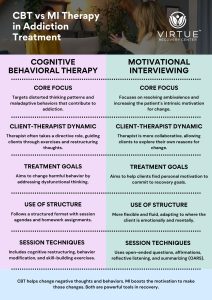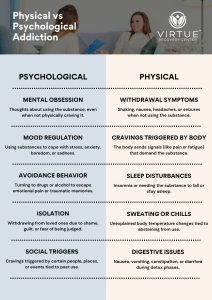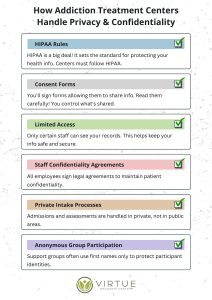Chronic stress and anxiety are significant risk factors for addiction. This article explores how stress contributes to drug use and addiction, the biological and psychological mechanisms involved, and effective strategies for prevention and treatment. Understanding these connections is crucial for those seeking to manage their stress and reduce their risk of addiction.
Key Takeaways
- Understanding the Link Between Stress and Addiction – How stress contributes to addiction.
- Effects of Chronic Stress on Drug Use – The impact of chronic stress on drug-seeking behavior and addiction vulnerability.
- Biological and Psychological Mechanisms – How stress responses influence addiction risk.
- Prevention and Treatment Strategies – Effective methods to manage stress and reduce addiction risk.
- Seeking Help – Importance of professional support and resources.
Introduction
Chronic stress and anxiety can significantly impact an individual’s mental and physical health. At Virtue Recovery Las Vegas, we recognize the profound effects that stress can have on drug use and addiction. This article aims to explain the relationship between stress and addiction, how chronic stress increases addiction risk, and what strategies can be employed to manage these challenges effectively.
Understanding the Link Between Stress and Addiction
How Stress Contributes to Alcohol and Drug Addiction
Stress, especially chronic stress, plays a significant role in the development of addiction. When individuals experience high levels of stress, their body’s natural response is to seek relief, often leading to drug use. The stress response triggers the release of stress hormones, which can create a sense of temporary relief when substances are used, reinforcing the behavior and increasing the likelihood of addiction.
Role of Stress in Substance Abuse
Stress is a major factor in drug abuse and addiction. It influences drug-seeking behavior and increases the vulnerability to addiction. This is because stress can impair judgment and decision-making, leading to higher risks of engaging in drug use as a coping mechanism.
Effects of Chronic Stress on Drug Use
Drug-Seeking Behavior
Chronic stress significantly impacts drug-seeking behavior. Individuals under constant stress may turn to drugs like cocaine or alcohol to alleviate their stress symptoms. Over time, this behavior can lead to dependence and addiction, as the temporary relief provided by these substances becomes a habitual coping mechanism.
Increased Vulnerability to Addiction
Continuous exposure to stress can increase one’s vulnerability to addiction. Stress affects the brain’s reward system, making the rewarding effects of drugs more appealing and harder to resist. This heightened sensitivity can lead to repeated drug use and, ultimately, addiction.
Impact on Relapse
Chronic stress is also a key factor in relapse. Even after achieving sobriety, individuals who experience high levels of stress are more likely to relapse. This is due to the stress-induced craving for drugs, which can overpower the efforts to maintain abstinence.

Biological and Psychological Mechanisms
Stress Responses and Addiction
The body’s response to stress involves the activation of the hypothalamic-pituitary-adrenal (HPA) axis, leading to the release of cortisol and other stress hormones. These hormones affect brain regions associated with reward and pleasure, thereby influencing drug craving and addiction.
Psychological Impact
Psychologically, stress can lead to feelings of hopelessness and despair, which are significant risk factors for addiction. Individuals with a history of early life stress or sexual abuse are particularly vulnerable, as these experiences can create long-lasting changes in stress response and increase the likelihood of substance abuse.
Interaction Between Stress and Drugs
There is a complex interaction between stress and drug use. Stress can enhance the pleasurable effects of drugs, making them more addictive. Conversely, drug use can increase sensitivity to stress, creating a vicious cycle where stress and addiction perpetuate each other.
Prevention and Treatment Strategies
Managing Stress
Effective stress management is crucial in preventing addiction. Techniques such as mindfulness, meditation, and regular physical activity can help reduce stress levels and improve overall mental health. Building a strong support system and seeking professional counseling can also be beneficial.
Treatment Approaches
For those already struggling with addiction, a comprehensive treatment plan that addresses both stress and addiction is essential. This may include behavioral therapies, medication, and holistic approaches to manage stress and reduce relapse risk. Understanding the role of stress in drug addiction can lead to more targeted and effective treatment interventions.
Importance of Professional Support
Professional support is vital in managing stress and addiction. Treatment centers like Virtue Recovery Las Vegas offer specialized programs that address the unique needs of individuals dealing with these issues. Professional guidance can help individuals develop coping strategies and build resilience against stress-related triggers.
Conclusion
Chronic stress and anxiety significantly increase the risk of addiction by influencing drug-seeking behavior and enhancing vulnerability to substance abuse. Understanding the biological and psychological mechanisms involved can help in developing effective prevention and treatment strategies. At Virtue Recovery Las Vegas, we are committed to providing comprehensive support for those struggling with addiction and stress. If you or a loved one is facing these challenges, call us at 866-520-2861 for assistance.

FAQs
How does chronic stress contribute to addiction?
Chronic stress triggers the release of stress hormones, which can create a temporary sense of relief when substances are used, reinforcing the behavior and increasing the likelihood of addiction.
What are the effects of chronic stress on drug use?
Chronic stress can lead to increased drug-seeking behavior, heightened vulnerability to addiction, and a higher risk of relapse due to stress-induced cravings.
How does stress affect the brain’s response to drugs?
Stress hormones affect brain regions associated with reward and pleasure, enhancing drug cravings and making substances more addictive.
What strategies can help manage stress to prevent addiction?
Effective strategies include mindfulness, meditation, regular physical activity, building a support system, and seeking professional counseling.
Why is professional help important in managing stress and addiction?
Professional support provides specialized programs and guidance to develop coping strategies, build resilience, and address the unique needs of individuals dealing with stress and addiction.
What are the symptoms of chronic stress?
Symptoms of chronic stress include persistent irritability, headaches, insomnia, changes in appetite, fatigue, difficulty concentrating, and increased feelings of anxiety or depression. Physical symptoms might also involve muscle tension, gastrointestinal problems, and a weakened immune system.
What happens when you stress too much?
Excessive stress can lead to both physical and mental health issues, such as heart disease, hypertension, diabetes, anxiety disorders, and depression. It can also impair cognitive function, affecting memory and decision-making, and can impact behavior, leading to problems like substance abuse or social withdrawal.
What is the 333 rule for anxiety?
The 333 rule is a grounding technique used to help manage acute anxiety. The rule directs you to name three things you can see and three sounds you can hear and move three parts of your body (like your fingers, toes, or shoulders). This method helps refocus attention away from the source of anxiety and towards immediate, sensory details, aiding in calming the mind.
What causes anxiety in the brain?
Anxiety is typically caused by a combination of biochemical imbalances in the brain, particularly involving neurotransmitters like serotonin, dopamine, and norepinephrine. It’s also influenced by the brain’s response to perceived threats, where the amygdala (the brain’s fear center) becomes overly reactive, often due to genetic factors, life experiences, or chronic stress.
What is high-functioning anxiety?
High-functioning anxiety isn’t a recognized clinical diagnosis but a popular term used to describe people who can maintain high productivity and function socially at a high level despite experiencing significant anxiety. Such individuals often mask their struggles and may appear outwardly successful, but internally, they deal with persistent worry, fear, and stress.
What is the stress-coping model of addiction?
The stress-coping model of addiction suggests that individuals may turn to substance use as a maladaptive way to manage chronic stress and negative emotions. This model posits that substances temporarily relieve stress but ultimately exacerbate stress levels and emotional distress, leading to a cycle of dependence and addiction as coping mechanisms become less effective over time.
Does chronic stress increase the risk of relapse?
Yes, chronic stress is a significant risk factor for relapse in individuals recovering from addiction. Stress can trigger cravings and influence brain pathways that control impulse and stress management, making it more difficult for recovering individuals to abstain from substance use without effective coping strategies.
Can Teletherapy Help in Managing Chronic Stress and Anxiety to Reduce the Risk of Addiction?
Teletherapy has been proven to be effective in managing chronic stress and anxiety, which can ultimately reduce the risk of addiction. Research has shown the effectiveness of teletherapy for addiction, providing accessible support for individuals struggling with mental health challenges and reducing their reliance on substances for relief.
Resources
https://www.ncbi.nlm.nih.gov/pmc/articles/PMC2732004/
https://www.ncbi.nlm.nih.gov/pmc/articles/PMC6308142/
https://www.mayoclinic.org/healthy-lifestyle/stress-management/in-depth/stress/art-20046037













